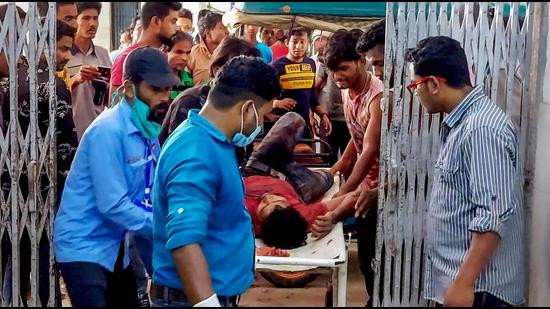Elections and violence do not make Bengal; its history and people do
Bengal is bigger, much bigger, than this small tumour of violence in its life and its people are greater, infinitely greater than the unseemly, untypical and unwelcome “goons” who hide within the crevices of its society
“All because of Bengal…” is how it is put.

“Were it not for the staggered elections in that state, the EVMs in Assam, Kerala and Tamil Nadu would have been opened by now and we would have had the results of the elections in those states…”
“Were it not for Bengal, by now, there would have been curbs placed on the public to check the virus super-spreader and this spike might not have happened…”
“All because of Bengal…”
This hurts. It hurts Bengal, it hurts those who cherish Bengal. But more, it hurts the truth.
And what is that truth? Let me put it in the form of five propositions.
One, Bengal has known electoral violence for years now. Two, that violence has brought discredit to the state. Three, it needs to be addressed. Four, the Election Commission of India has to make note of it and factor it into its scheduling of elections in Bengal. Five, but — and here I might invoke the Bangla word that is also a Hindi word kintu — Bengal is bigger, much bigger, than this small tumour of violence in its life and its people are greater, infinitely greater than the unseemly, untypical and unwelcome “goons” who hide within the crevices of its society.
Click here for complete coverage of West Bengal assembly election
The word goon enjoys currency in the political discourse of the state. All parties use it to describe a category of men on the other side who would be ordinarily called thugs or toughs, generally strong-arming simple people by their aggressive and intimidating behaviour. The compliment is promptly reciprocated.
The goon symbolises electoral violence in Bengal. The open secret about the goon is that he is not even remotely political. He is just what he is called — a goon. Looking up the word’s etymology I found the word comes from an American slang, though there is a view that the word goon is derived from the Hindi word goonda, which has the exact same meaning as how goon is used in English.
The word thug is of established Hindi origin. But it cannot and does not describe the world from which have come Munshi Premchand, Acharya Narendra Deva, Subhadra Kumari Chauhan, Maitholisaran Gupt, Mahaprana Suryakant Tripathi Nirala or Mahiyasi Mahadevi Verma.
A goon, likewise, as I said a little earlier, symbolises electoral violence in Bengal. But he cannot and does not symbolise Bengal. He does not have any title to Bengal or to being Bengali. Bengal is bigger far than any election that has been held in that state, greater than any event in its chequered life.
Do I say this because it is the home of Thakur Sri Ramakrishnadeb and Srima Sarada? Of Swami Vivekananda and of Sri Aurobindo? Do I say this because it is the birthplace of Rabindranath Tagore, Bankimchandra and Saratchandra Chattopadhyay, Kazi Nazrul, Toru Dutt, Sarojini Naidu, Mahasveta Devi? Do I say this because from its soil have risen the great scientists JC Bose, PC Ray, Meghnad Saha? The great artists Jamini Roy, Nandalal Bose, Ram Kinkar, Somnath Hore? Great economists such as Amartya Sen, Sukhamoy Chakravarty, Ashok Mitra? Great statesmen such as Surendranath Banerjea, Chittaranjan Das, Subhas Chandra Bose, Ashutosh Mukherjee? And because it has inspired heroines in the freedom struggle such as Matangin Hazra and Pritilata Waddedar? Of course I do.
Do I say this because by opening its heart to people from beyond its frontiers, it is Bengal that gave the greatest Muslim statesman of our times, Maulana Abul Kalam Azad, a home for years, gave non-Bengali teachers such as CV Raman and Sarvepalli Radhakrishnan their great renown, sent BR Ambedkar to the Constituent Assembly and in the very different field of cricket, as Ramachandra Guha tells me, gave Arun Lal, originally from Delhi, an opportunity to play for Bengal in the Ranji Trophy? Do I say this because some noble souls from outside our shores such as Ronald Ross, CF Andrews, WW Pearson, Tan Yun-shan and Elmhirst made Bengal their home and gave to it their skills and compassion, preceding Mother Teresa and her immortal example? Of course I do.
But I say this primarily for another reason. A reason that has to do with another greatness, the greatness of its simple, ordinary people, farmers, mainly, mazdurs, professionals. In 2007, during the height of the Nandigram crisis, I stopped, without notice, at a hamlet near there called Muradpur. It consisted of not more than ten houses, around a pond. The occupants of each mud dwelling asked me to come in and spend some time with them. They asked for nothing, expected nothing. Some offered me food, some a little place to sit on. One homemaker welcomed me with an impromptu aarti. As she poured some drops of precious oil on the wick that she had hurriedly improvised, words lost all meaning. Only faith remained. Soundless.
It is these simple people who make Bengal. They are Bengal. Let us be proud of them, be grateful for them. They deserve an aarti from the rest of India.
Gopalkrishna Gandhi is a former administrator and diplomat who has also served as the governor of West Bengal
The views expressed are personal




